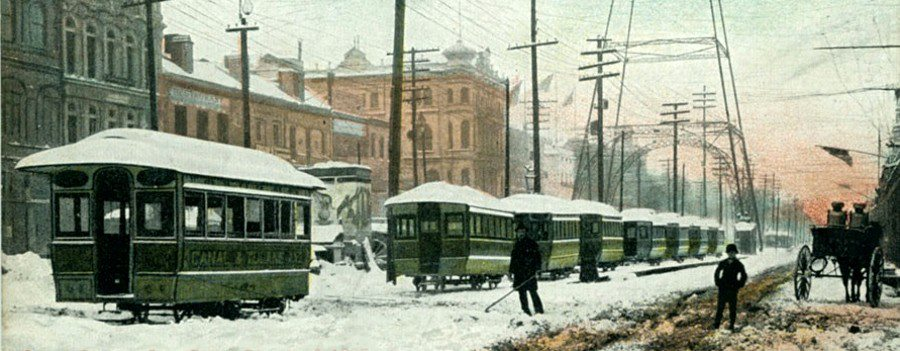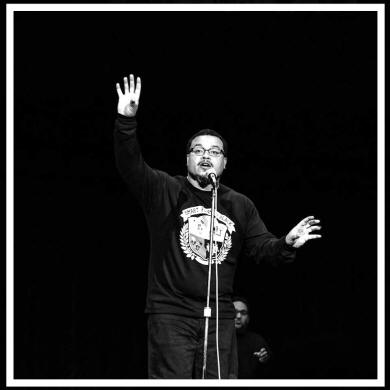
~ Delta Poetry Review ~
Junious Ward, Featured Poet

Junious “Jay” Ward
is a poet and teaching artist. He is a National Slam champion
(2018), an Individual World Poetry Slam champion (2019), author of
Sing Me A Lesser Wound
(Bull City Press, 2020) and
Composition
(Button Poetry, 2023). Jay currently serves as Charlotte, NC's,
inaugural Poet Laureate and is a 2023 Academy of American Poets
Laureate Fellow. Ward has attended Breadloaf Writers Conference,
Callaloo, The Watering Hole, and Tin House Winter Workshop. His work
can be found in Columbia Journal,
Four Way Review,
DIAGRAM,
Diode Poetry Journal,
and elsewhere.
Kodak 4200 Slide Projector Asks if I Ever Held
Hands with My Father
|
I. In the first picture my father’s hands
ain’t holding nothing but a cooking spoon
the wired remote, clicking to the next slide * In this one his hands are near a hollow steel pot first day as a cook at Hudson River State Hospital
he and Mom met there is a photo focused on her belly my hand walled within * Here a custodian covered in grease & callus—hot water heater memento He needed to be loved/fixed
instead I’d pretend not to see him in school head down timid waving as he passed
II.
light dust an odd hum blink of machines oscillating past lives against a transfigured wall |
I hold a lifetime flashing against yellowed plaster empty where I imagine his hand reaching impossibly toward his hands really could fix/love whatever if I’d let him Memory merges with the present— hospital room tethered like his thin
fingers resting in mine |
The Narrative
The stories tell so similar I can’t tell if I’m
dreaming or
remembering hands pinned to the ground, hands
penned
writing some manacled vision of the future.
Hands behind the wheel or up, a toy gun, a
licensed gun
—daughter watching, mother watching, father,
son, cousin.
The stories be so similar I can’t tell if I’m
dreaming or
reaching for my ID, stepping out of the car,
compliant, viral.
The assassination will be Live, my brother, viva
la revolución,
igniting some Orwellian vision of the future.
No text by 10 p.m. No call by midnight. My
biggest fear—
babygirl gets pulled over and I find out through
social media.
The stories are so interchangeable I can’t tell
if I’m dreaming or
the body camera was turned off. I know you’re
tired of this poem,
its nagging anticipation, its blame-song, its
gnawing complaint,
all poems, inviting some pissed-off vision of
the future like—
open up, hands where we can see ’em, he’s got a
gun! he’s got a gun!
But I assure you, I am shopworn writing this
poem, more than you are
of hearing. These stories—so kindred, I can’t
tell if I’m dreaming or
fighting everything, everything in me, to
envision a future.
From
Composition
(Button Poetry, 2023); reprinted with permission by the author.
I Love the Hometown I Had to Leave
Rich Square is a small town with a pull
strong as nostalgia. Small
like an atom you need to stay and escape
from, split without exploding.
I grew up in the chemtrails of segregation.
My white mom went to the Black church,
not far from the white church.
My white friends took a different bus,
played at the same school but never
the same house, grew up under the same flag.
I played in the woods, or on Creecy Lane
with the two Maurices, pig farm across
the street, cotton field down the road,
corn next door, humid, hot, and hazy.
Gravel driveways announcing visitors
like a crunchy doorbell. One stop light.
Pickup trucks and white friends—
both with Confederate flags.
Water hoses doubling as water parks.
Cadillacs and tractors. Dirt roads and street
lights.
Juxtaposition is common, like South moving
North,
like New York cousins boomeranging back
to this ground. Home is a return to dust, root.
Of course I remember Black kids being told
the pool in Jackson was closed while dozens
of kids could be seen splashing over a shoulder.
Of course I remember being followed
in the store for a zebra cake, called “boy,”
him tapping his waist. But what brings me home
is what’s inevitably mine; riding around
Chapel Hill Road like I own this, the bridge,
the graveyard my father is buried in, home
of the Rams like I own this, return of the
bubble
goose, cornbread and corner-store swag, like I
own
this, Mad Dog like I own this, Southern Comfort,
Boone’s Farm, Strawberry Hill after the football
game,
Spirit Week bonfire with kids who make temporary
friends with buying-age bums—symbiosis of sorts,
Styrofoam cups, 8 Ball—an Olde English accent
sloshing to asphalt for the homies like I own
this,
recurring orbit like they know my name still.
From Composition (Button Poetry, 2023); reprinted with permission by the author.
The Flat Harmony That Shivers the Air
after Kwame Dawes
I think, maybe, I’ve always known grief
tangentially. I am mourning, at the heart
of it, someone else’s tragedy. A sudden loss
to me is moreso a spouse’s loss, or mother’s,
or maybe even the nurse who had to watch
another iteration before her shift change,
reassure, reach momentarily across
a stranger’s shoulder while prepping the room
for the next emergency. I think I’m seeking
a branch. I want it to stretch to my numbed
limbs. Take this cup. Even prayer is a thief.
No one has touched the box of pizza.
The air is a blender. We spill over each
other like bubbling water. Mucus on sneakers.
Our bodies barren and waterless.
“Our” helps me acknowledge others in the room
while distancing myself from feral screams
gutting the halls. “I think” helps me avoid everything
definitive. My saving grace. I can say “we
are losing something” instead of “I am empty.”
Because who am I, at the heart
of it, to risk consoling myself
when tomorrow the closets have to be emptied
and the house might go up for sale?
Arrested at Gethsemane
At the foot of the Mount of Olives,
the boy is a garden, he is tempted
to become someone else.
There is a trial coming. He knows
the outcome. The boy is a pocket
of holes foraging lint to survive.
The boy is his father’s son
and mother’s miracle. The boy
is being raised toward the sky,
a reckoning. There is a trial
coming. He knows the outcome.
The boy is a cigarillo. He is lifted,
he is lifting. The boy is a thorn.
The boy is a droplet or a deluge
or insignificant. The boy is waiting.
He knows the outcome.
There is a trial coming.
The boy is my only chance
to get it right. He is wasting
in real-time; on a tree,
on the street, on television.
The boy is a version of me behind
a
heavy door. Who will roll this
stone
away?
The boy tells me “stand, again,”
and, even knowing the outcome,
I do. I am first on my knees reliving
every past, being choked, gasping.
Then I stand and pray
for those who pierced me,
so in this life I might be
a savior.
| Archive | Submissions | About | News |